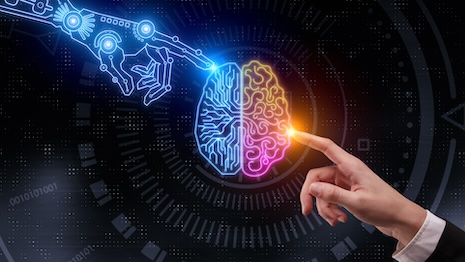By Maani Safa
The continuous evolution of artificial intelligence (AI) represents a plethora of challenges and opportunities, but personally, I have not been this excited about an announcement since the birth of the iPhone.
The advancements recently announced by OpenAI and Google are particularly transformative, offering new capabilities that can revolutionize how brands interact with their audiences, personalize experiences and optimize marketing strategies.
It is increasingly clear that the future of marketing is intrinsically linked with AI, promising to reshape the industry in profound ways.
GPT-4o, OpenAI's latest and most sophisticated multimodal large language model, can handle text, images and audio, facilitating seamless human-computer interaction across multiple formats.
With enhanced language comprehension, superior image processing and advanced audio generation, GPT-4o significantly surpasses its predecessors.
Google Search received a monumental generative AI upgrade, driven by Gemini, revolutionizing how you use the search engine by retrieving answers to your questions directly from the Web.
In addition, new features enhance AI overviews, allowing you to plan meals and trips with AI assistance, and even use video to answer questions about the world around you.
Personalization and customer experience
One of the most significant benefits of AI advancements is the ability to deliver highly personalized experiences.
OpenAI's GPT-4o and Google's announcements at I/O have drastically improved natural language processing (NLP), enabling more sophisticated and human-like interactions.
For marketers, this means creating content that resonates deeply with individual customers.
Sam Altman tweeted (X’d??) the word “Her” during the announcement, and he is right. We are almost at the stage where ChatGPT feels as real as Scarlett Johansson’s character in the movie.
Up until this week, the potential for AI to engage in human-like conversations and interactions was good, but not evolved enough to work flawlessly as part of a customer-facing product or marketing tool. Especially when it came to understanding context, generating fast, accurate and reliable responses or personalizing interactions with an individual.
As we saw this week, the near-flawless interaction can easily mimic a human's mood, speed and intellect.
For brands, this means being able to offer 24/7 customer support without the need for a large human team.
These AI-driven interactions can handle a vast array of queries, from product information and troubleshooting to completing transactions.
As a result, customers experience a higher level of service, which can significantly enhance brand perception and loyalty.
With the launch of GPT-4o, we can also now analyze vast amounts of data from various sources – including social media, customer reviews and purchasing behavior – to generate personalized content.
This allows brands to tailor their messaging with a near-perfect human voice to the unique preferences and needs of each customer, thereby increasing engagement and loyalty.
Imagine a scenario where an AI can craft individualized emails, social media posts or even product recommendations that speak directly to a consumer's current mood and preferences — such precision in marketing was once a distant dream, but now made possible.
 Maani Safa
Maani Safa
Ethical considerations and brand trust
While the benefits of AI are substantial, brands must also navigate the ethical considerations that come with these technologies.
Privacy concerns, data security and the potential for AI to perpetuate biases are critical issues that need addressing.
Both OpenAI and Google have tried to improve their AI systems' transparency and fairness, but brands must remain vigilant.
A misstep here could be disastrous for those who may have relied a little too much on their new friendly “AI” brand ambassador.
Building trust with customers requires brands to be transparent about how they use AI and data.
Brands that can demonstrate a commitment to ethical AI use will likely gain a competitive advantage, as consumers become increasingly aware and concerned about these issues.
Looking ahead, the integration of AI in marketing is set to deepen further and its role in predictive analytics will become more sophisticated, allowing for even more precise targeting and personalization.
Developments in AI-driven augmented reality (AR), such as the announcement from Google Astra’s AI assistant or examples like OpenAI x Be My Eyes, will offer new ways for brands to engage with their audiences.
It is now perfectly feasible to imagine a world where there is a seamless digital layer between us and reality, with AI voices helping, guiding and promoting to us based on our mood, location and a vast array of other personal information.
THE DEVELOPMENTS IN AI by OpenAI and Google are ushering in a new era of marketing, characterized by unprecedented levels of personalization, efficiency and customer engagement.
However, this journey requires a careful balancing act, leveraging AI's capabilities while addressing the ethical considerations that come with it.
As we navigate this evolving landscape, one thing is clear: AI is not just a tool for the future – it is a fundamental driver of the present and a critical enabler of marketing success in the digital age.
Maani Safa is founder/CEO of Poppins, a London-based agency.
{"ct":"CHcpctPcq1YmK+EKmXXLAuhSkLXr3UL75BltSZb89yiszv6\/sPHfn7rucHcL6GOTgMM9O4ToJumYGdIpwH\/S8w8JIdAN1PbJskhZ52MgATAdvR58YilLQtpUGLdROXYq\/r+rD5bZVsPrVpce2kWpWaYRZCr7cKlXG4\/aKNA+QGERxsamsvTQ+C4CzZ0MHzEUpV0NBACX80K0E8pqM7xeD3fwMkZQdolIa+4y65JphLfFpMSBtOQBH3eT3OeKO36FSOgDUyOeIolroKybkxSy\/WuGR4a6D\/ddxGrfbFFMASpVZ8nYAMPIsmxAw+S9n4Py9ooq81IMYvEKGHAHF09k02hFiFmZtWhHGGXOpXG5Ch7poAWOvWLtlhHcryGdhf4XvHDGbq8edqPspGlklpTocVtAe59oTLt1tQ\/VZawimShEE4FTEiyxxfYw1tRXT7zwLVtBQTbn02DnlKZ5S3LLgwCHryzGe5ykTzVoMIK+Asq5jkQ\/ZzrimV6SiN8HXE\/ai314fW+eMPj42JNusK0r2RraXJANgc3nkUt39\/MzKm8toIDA5+nQmlUFLwEqeP\/GQQJYz7NYtwWbcxn42Jk4oQAyxfm83vthczmPlODzjtdfVYOTVKaSNQPEGzpuX0mNjyZMdbcFMAkLtx48qPvnUcRNJDpoClqTKa5SwQAIriDJ\/8tlpawzTEd6IKetPB9pScdfTzC2YkK0PGkrqlwvqiRqWMDQDFujfIrDGGScqZ1H8HCrIGXHQsO+XFVW+T6En+1QKmzZ0ztEZQKFW3iLN3Y+0u+NnGK23v\/q0AwXHKfpViaYAsOodqFvwHGWLk8Iz8lWDFuX9WTp4kMp6h0m\/rBJA\/KbJCdhGNw1OsBEHWpkFY9lqnidUsYW4gPiweNte8ETcXD+lFjoM7wTdG5l\/0PDvEznEyI\/O9hf+nAGWeyjMEJUEJ6QPTYemrgeQ11E8dBBM9DOaPTIWiGYMDCAaqs\/YyjkAIfk6vDbenFGlHUZvGCosqVwjHhzm9Ld6jjt0rVPFqkeNp45GTtroFs3ki+HQbN5sxHENK1NJeDGxkvHSNULRkUPMPc8UXa0eP8t\/n5PcNwXiGNt65+jevRjNbWo2gtnnKdWzdf+V6GEi7Q17Z8KxN0i1Yt9DfrZaOHREVRgiYByO4CckQEYTsOqykmzzuSg5tNuv5XjuSOsegJ\/D7VwbVPNZ+llES4Ht3bwt2ayrHRO0SZg8utLqZujwGjlpbouhwPt1L7jZisPY5NXy0x8dgNVJ7r7Eh5z3cmN+3W0TZzG\/PMLleO623LaHv2vOyZlw8CsFzLBw7fUZeDKp0h46iwdt1gHc38k3+ERL6\/ArTHYfvfshsi8b981PB3uN0yKhvZlZZ7RrAqU\/d6LHVMB9VCSKg76ozWiPrQqw+1yYUlZitwkMMKP2bJcfm8mwQH5r7QU7lhO4iLBPftXjt3KyL0lD3rdmND6TlCSJKG1FzrWyjwMjC0fVPJfEFZ\/SYgFVe9FX9fWTCGNw6LFovzZo0YDbG7xXmDMupnOv\/d4HiDSyWCAkWTFgVkcwGCJsD1q9e6h5x9S2Sfg20lTBEQxlX7n+Vas1+SvpawrlRgRqx\/He\/uyheJ8MQlNmjUjX5J+NTGisrmnuW\/ZowP\/3YoWiEYwD0ueorjZEJAl6vLTI7AhmdP5dMX0Iu0A0tMXzLaVKlFCoKtWmjO9Zh40sfLts8gIJCw2ER7EnPxP25OywnkbTleQl5OJvSX+FyBHpf9Dw2qnQ01R6A1Srvnmt+drnqdbJDjDqsG+syncpdHGJMKU5zOI\/f3vvZ+rfq\/cWtJg2vvqG9bS4oIqjHX7NQCjaomNS47knlwKfIXR1DwN5a38pcQk0Y2Xjj0b7pVea4V54ZYdDR1isEx16aAUpSDGBj\/yjJvkrfqtHphawZt3LDJAVs\/swDyZchctOcYWd9dnEW+t5S0ME3X2I9Og+cYLlGmvvJBPukCg3H3CwmplJDde7PBLN4HGWJZR5oF+rqDCgoHfL0LH5SWSxMEQiSnILyIb2aICSCN42vu9jR9Tk8vCaH1M4Ke1wLtLB3wrM54Ce55pQjR\/k7bIcjRpILVKvJfAR4cE7kE8F7Zs27JCVkMa+Vy95tB00kY1egqCLu8wYHBqespk+lO27dlnhUNENqtgqQUjvyStCPxcvycx0vixoiJR6FdsXwCT+qecmLc2wq1xFCgi7Wuo0wt0Lio97aVvZmGuuKIpvh3UgJy+o4tUaqNl34fnWgkxu8ejtbkQXrTFSfntEM5qk+abwomUi2SUkqPMuMdbDmt\/Zy3zA8ccgckpYSMPBM2VwzBtk37Fyg46WRaqWJSNXxXPaOF6TL4jH7kbBtqOFXbpnm95kLmYtE2HeLEZfx6YjmrUXbc1ak0kcdleZ3DFHdg3F7CqQwZDkpJa0b8bCKQm\/wQQcm4stVpkWlRc\/w0Hk9OUqwuFnbHckWXk6yNawgwNWGA5LHtZvKJu463wv8BiFFBHkbZ6nci\/zTPoIXlcPyNvdKl0KuoHK9u203GnFBtAjor5RBzOHZvDUTJZxB4uPXM70gl+vh4jogm7nGHJVBTSukec1afvdp5f1aKbMQJiTGXDpvCkGRn3JfKNST+rFJzuxCufY\/orn2LwiJ6ElVnSIrshGDw7\/XBMcK5h8R1F630Aq7XpsMxBUC\/ZfyFbVE7nidonKHZQ6j1w+v8YTuhcKhDFVYDZG3PTzo60v60WeZiiDQoEbRKseMZcr83y+bYtjoiwJTGnd3uenzONjf7evu6tQ72eYhl4gvHD\/6oXOtpdz0y0DVnrej37IRhwcWJN7cgEAVGmRk7Ss9a0u9DIFX2fuqILUytlHwNG0xUKLFXCJ90aZwYkKnHx1XC7uFP8K3r\/iavFzi0BJ3RyVEYm5+4uYLvmD5K0jan\/qgdzesCV6UQcS5N2n562KmWYPRmNiwiIAwgUMLjVFvE2UvT9\/7oVuQ1BVAf8txrI95sLGy6OcQswm2nxWPaLwnLkqTFWpPnMHA65bEjLryaORcpWKEUL7T\/MeyHaACoDHkkZez4H57UG+GFafsf+X1r9LjcI0jt9pzw+poWJkv2Yrx5rpIYPDhF5t05Coj6pQ3vcUFvMQOhRL2+U\/kgTCqZPyDLtFDDjGILGWhGmlAGjab+pTovUvIqEdc5PvBzQx9VvI\/thdojHyoywUxq3a3twE1cJTUwkZ0c+IkmP6tm7lM3YRC7dodqqzmgKn2Qr0+rwWiGc34SPpvGWd+sNh5s94MonCnSwL6bivpBWzqK+sA8F0KsIxUqUs7BcRi4l9R+oPBv2iJh7DCCKyZeYV1d70EGOvnwe4COuEI2gxY9YbdEOo7fydeUGj5PJsZyFEuz1UyNy820zyCJBwtVl044U74Yo2qGGzVEwWR7GmFRZjJyzPAUL9DZAE5l2G1VPo4QFcABiKnTGaKEvvCRYk8D76d6RsQr2x\/c+\/r8WYS1KEY1frfs8mfpxtNEPcLt6TM3mpvziR+vd7SrlK9GWCenBkwGh8IM73Mp95\/C4xe\/NGRa0fkxL2mnfobh4wxeWxWUGXlOCS80m6zZN0kMaGuTutgD\/5awPxGVVyMPxRCLEK5ocUmFoKvAxIt1arR1pzAwdf3\/jk87uW7IsteiJmit0fAFFfx3qsB\/AoacXzOIWSsvXNt3sc6\/NxOeVL58D\/e326+T\/HKaTjoJQezX2Jqq5ivvHm\/d7z9g8PCyyzIjMLjWhbKk1y3WT\/gTgOBLMBEXOqRiHpx+F5aj6kie\/PFvNyoXLyFCRA2IwcstX52Sax0h100RiqWhKKR5KSSnxKhIyqqkq33XjbybMeJSFETTtg+jYwWU1iFZ1hnje7cbXEUBhmgyIRNnJrZchyAxIW7g\/8vE\/dLRSrEUmhK1DJotTOarsYiX9sjkGQZ7L+MnpaQop+ohbC4ssyMax5L0RBoX2adUhWRbO5zHxc3M4tSWRWPBH2ov+oLUOQ5qA3x9s8jLMqwkzQ3srs4wZ2nrAIyvwq1OgD31UVP+sAgm45BcjN+qYxJJ4DCcTAljrW3PLQdQjuEfcoFNQ8RtYVrd61lpZBQhKVDy4a9J330zVoslxfZli8nIDPaPWkX4xL32axuCmDtSy6JovqWMKUQKpC5ZU72O0FWqmgLvJfmK9LnLzokN8BUOQYv3ZVZ2zD445uuKFZ8lvqlSVwyOaXv2PnInCTGwgQZ7zi\/t1ttcLj6WitOzXT6aiciS3EV3es8ludbKovv4SgihlUmqJ4rVeheh4Gr65sLXHHkcSyBXrhJb2zeBznStMAt4H\/9TJzznKRQHs6NPf\/Lng5VQ+j1zGbAkWqoVzsyTRiqVzj\/4tP\/2CRkyVZgDlWRHThA2G3PWrkhXIoXtzD\/RThEg9NKWIEsGm2YKHSinpK54L04kZU1N6Lv7kjp+NV\/hMAQeQCFGqa\/gCbpa7kIAszrCfexbzpfiwEjPmoVeokJTwp4jzlTQmA2HwVKLcmcQ2RljI\/sJLjMpUfuDjJEQq12R\/BqdEO7uLrudIq7vQz7oANNMvi1NDoDkHy8DpNUjRbvrhbx76GR8WScV3qwJeMmK8a3vVXV+UklgPBiEdBmEHpbTID\/AFNO2mhUR7cKAgFwbWCttcKCO0FCPxIWrfCAMdAHgPt7QWjunrJPcC+ufM\/LaQvRCtHdQ0LudfSSz3xKsx1fF3lN52Odl+aK0XvlL0fA8J\/CQB4Pet2xDgDHCc5K7Zglw5DjwpacWt1NEPCXVw1bV\/L4Yi7TrgnUDuncRGSu+sTavXZEiqHX4a5OtKJF9X2f99EyqR\/XTXJ\/iW86Vdkx69hOeFu4VLr2aY53mWFiicFnwcDjKjMQcYPcpSiKRT9XWDbEUsBTYGt+IwNPEChVXTmLmrI1Sywyz45+bbH1oFV10d9XDJsU688L2jVkXhduhb170lQM83CfEhxCFuEjsV5z\/1QLATylGmLd1SczRoSmngjeWef9MQWWApt3syH2oEQ45NIUVV47HgToQlyEF7fKOQZw8dYk6PxhJgAZHH5sLnVLdBeuKFppq8O5WF9fd59SVrcl39U6mrjq\/gDldih7yvYMo+m7WYOHMSVHF6A4hF2xIuVyDERUMuTPhDKIXTfZ2tTh31OR0xJKpmezdmlJaeD9b5\/eVlwqT0vVKcB5QsyvJ+My4M8zTmc19uglkoXQe0RSHULDlIv6iC6c2u29TKFgdNdqL\/WEAx8AQy+TwU8I97M1u0AOlACmMEL9SMEOJcYkaduBmClUpxFT\/yrL7p4mdhyTsmA3+AcipW2LrY\/l0G3yU8GyxXieAuYQ9ykTnQ0D\/ztgwQTA3sJsADX+TVomEojSHJiVpgTUlD269+k1D0Q1oG8BjpQhPWp+IOOlnRuTe8lVfeZZb\/Uxoi6O+TZ5Kkxtv4cTmDkR3ssnn35Pv2kHbojcULN74Ojbo3dte4AZdRhcBuYq0TLaJsWZ\/tg88EAy4JcVvMM0HyMZDv54yHi5g7XzRj2mDe8S28wJdXBrtqB52ekkhs9iJB0a+D05Mkk01Qni5t4MLh88uwaNTfkgLayY+zkE7cj+tRjGPZA8JcsFf4O2xSen0qlJp6MH\/V1mLhNmkK+LyR5E48Wlpb7gh1cQKzGJmc4SwhGEnx6SqBbK5aj2KV7Dwg1RS7cQvGuvFdNiujNneoPjdDpTdMEtivUTLYvmHk5XU6+6FSGdffV6CEvm9NuCHTZ3cHgqNDAehNsqeAS6JEFIKdJzdvv58xFlsh5kfjCbsY6kY1BHbNpJCo9rGGSUGXWFuKTe8m6+WhmlMEkyza+7+gE1i2d5NiERZuBFJxnEsfaVrL4tFwR1o9Ty8avHoyxkMBsGbGMmwCudhAZ1GiDdmcKfZ9GSc308bLFa2pAoLKhikwcNzwjXMgk35RbYREkp7Df6rlP0rvUp\/fzE6i2Vk6EQ7jPxrGNNgyrFypq3\/6dfXN1Lx2pHH4HteZYcaWYPoRZyzMoHTNRz0YrHxlX6M2J6dBQ8DffJnasiNT9diFynftIr7Q4FApL77ru4yCM3si853fY5w2vxGOi5R\/aC4zcmeHPOlgwHbDdImJrV\/uZ67T5sFHYF4Tp6cX+smoV9fGVQc09XAD5dHqBDvR26UfeVWbFqVCTLZ2j8wjQLD6cvOtxOwmugEnjaAIXhSr8bmiFXfn7iiNJOiqueqpqRWzt6m8dB+PrCopkRzMMY0mC0kwfd0sV8IH6MzkavQLh3+OJQV\/BckpMz5r7QrbWT6J0OegBU0CJ7YsuNorNGtaq37iu\/iGEA0DW3Cq76hfxmPRA03VUEfbViPmZaJrBOhL5P5WucRt9V3YGWDORYI76kJ5HMl\/93qjtrHfCpzUmZ2kvpsiUuiS6D+YzLwFD3yJkWDZW1pGpfs5nJKDr7XQa2CAcXZe\/2oeEej4qUcNMJAe0qzSKZiRLgcFNpSKYLuNX+OeEwEFyy6sHlXfxDAai9En0vZYAOQ9h6GMwGybuKnyd05kMbUUaWjXahbsHeqruFh0KO\/8aqVhPrLQ0qBb9jUJCNFk\/lkUuNbk0b3wJmqj6LYfFVrwYfSdlBkQh3I+5y5AqX5nL9gNuIX2vcWmFWtIyCyKDXpg9ekR1Hp43tvj5B+7A+qX0sTcvnN9CtbGn4XsMwNzW0OmtiUPOGxxkJWlIUHVL4\/L8iTcK54XbQKX6s8m+e0CDekOWnWjV3jmN6pLVqtwmHe\/x1vdo4iA9Vuv59EhpGsmukKg1YZUWuk6LCAev\/2CNqucxH0hXFkSZGHtsehgAc\/JE4V63Q2yg7S0NgjqXYRxh\/xSEtmi8mAJlaYIaTjWMPKp4euqNTzUmhjVShGj8xgMCD5CBDi1d1LoSJZEJOlqT69CmD4FMc19ErwKGeA4l1iLtm4XvcZYeN\/V7f3b\/K+UvKzSZ1nt\/7LCLoBLXNj2SgwkaEHRaxu5bb\/xkRmnOc0gwNnTowjbF1oSCpaotOO55wJGTjIOuu5XF0PS69IqUV7Upcl33mjhQQ1E7Cd4Lk1YD6lgYnyHz8iIy3CyK55H74EnyVrZLTb0rZzLOnPdgTHwp+fpmhO3L8QQJ6U5DlhJzqNEgzVuaGIcg90CRt0yOT\/XW6qBxCt32pDozk23QfKf1dzuleU4IG90epmB8EHttuKAaIGN+xeAdnD\/yP83Xl8IdocBTtvPBi8GjbxXJDFN4cqX7yhqdoHunx9YEafntRJfT\/GfvX8d\/XWm6cbUJg4\/LwtGn+wMpuywrXxta0jLm4MrJD8+28fgmuJz7kyd9e18D9Mo8nMAYy2Gd\/DjgehWbOquL4CDIcz88y86UK44DZAT6KlGa6xIPkxI2GivwkGML4HxFs3GjcqFtLpr6voeN3s4APTYKKYmjNKFuz36LDadAgt8H7YEI230lXmS5enXLPCBm39FmFNwsjwEHft38NXrvHFU3OaMNnM8cgR1sjpsOUhAHA6Sn9Yxv5b2eHIbo1fiQNqNcVUk5ySuf4pyueCSatjwFUYsQk5PXYmpzu6pG1j4AmLQGxuZ7IclhdERNY7oLQhDENqqFjbxTF1yAKsJ6rKKhhar5+M9PUtONMglAVR1r1v63xOsgZcC8MUgr6ITjheiphsGAyRj2G07NMaezgnJaFaX+euCRtJtS8+DXM0PEIPxNFymlfvxAPEKybUyxdwms1Vck+JdGkuJCscKHgRNoWxIB19MT81sM1bV21YE2QvaZfFY+n4spGPFrzHnyC99IoEYUMu5uNp\/5X6KIIY7KgFmmscGdjUsPTmY3PwaExEwfax58cY3TJ5JTrNv\/PFqsKM+CYUyr8MulZhzYuG6C2eBiKPNRh5bR+1EEjEf4DJj+SgFDOXDFmG5u1gedCWRNL1kXRgfU9oHnsgF1wNF4kOW0D29mYGdcwGAfW92dg1DIURGB65b8T+\/W8eGeCe\/vBdWAE4nRssFMptM8Zylm\/xUXCtY0D6S8kC+CC7RWMs0hlVfW4sZjvfk3IJ5ByW2+LyJx4X4gp6F+9alBRUVM0fC8fGnTbgdiQGMJMX58\/9t8I1KXlm8\/exWNAzayjInYimkaQiJL49wCqLPOIwAaKsmij5ZJicpq0Vo2MbGVByzgsFtvvsiIOD+8hLaYxd5jaZ\/D4haSk7ERqDSB5xLL7grC7IWRh45b5c9rLuGjksUxFg+nLZ3AULlTww+3dibjSavCZcB5IoayGawvc9N9MBlQp7NLyXAbqn825nBKLFvEIc7e9JAXX3cqZg6Wq4PxEgZYtmhX1a7oT4O5fRvHQ1d8UZ6Ccu+4oGPr3lsf3\/gliwXbwX6vEJiLrUM4at0Ms++5bu5bKmkXAEici+cC0EfIoJCCoq4x8I1fcq9+Jy5NUO1hMaEvNinDyJJkhWc9QqkkIyLo7+c13NF+PW3Xt1+nwEvC5OhEh81QQNy27DmUv59fajOJGQSx4ZWTTWQFNf3e4KWme0kDEYQ84oWjBeBtKznHk4FSWJnU+OcV5tSRA19nlTMZhUjHsZ7BizoA+w682GdUqJZz7+td5q0GZEmZM4DJTtKZENQng==","iv":"340392acae1db5170df11b344bc49152","s":"2032efbc877060c6"}

 AI is on its way to meeting HI – human intelligence
AI is on its way to meeting HI – human intelligence
 Maani Safa
Maani Safa